六年级下英语单词句子
- 格式:doc
- 大小:44.00 KB
- 文档页数:3
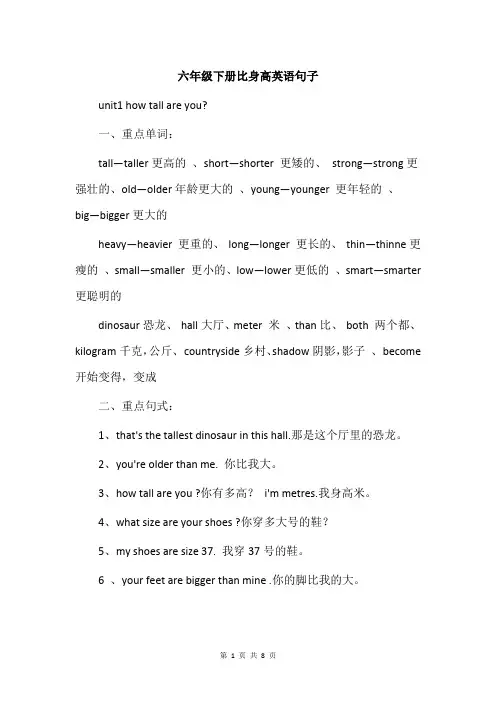
六年级下册比身高英语句子unit1 how tall are you?一、重点单词:tall—taller更高的、short—shorter 更矮的、strong—strong更强壮的、old—older年龄更大的、young—younger 更年轻的、big—bigger更大的heavy—heavier 更重的、long—longer 更长的、thin—thinne更瘦的、small—smaller 更小的、low—lower更低的、smart—smarter 更聪明的dinosaur恐龙、hall大厅、meter 米、than比、both 两个都、kilogram千克,公斤、countryside乡村、shadow阴影,影子、become 开始变得,变成二、重点句式:1、that's the tallest dinosaur in this hall.那是这个厅里的恐龙。
2、you're older than me. 你比我大。
3、how tall are you ?你有多高?i'm metres.我身高米。
4、what size are your shoes ?你穿多大号的鞋?5、my shoes are size 37. 我穿37号的鞋。
6 、your feet are bigger than mine .你的脚比我的大。
7、how heavy are you ?你有多重?i'm 48 kilograms .我体重48公斤。
8、it's taller than both of us together .它比我们俩加在一起还高。
三、知识点:1、形容词变为比较级的变化规则:(3)肯定句句子结构:主语+was/were+其他。
否定句句子结构:主语+wasn't/weren't+其他。
一般疑问句句子结构:was/were+主语+其他?肯定回答:yes,主语+was/were .否定回答:no ,主语+wasn't/weren't .特殊疑问句句子结构:特殊疑问词+was/were+主语+其他?4、情态动词can在一般过去时中的变化:can在一般过去时中变为could(could not =couldn't)5、含有实义动词的一般过去时的句子:变否定句和疑问句要借助于助动词did。
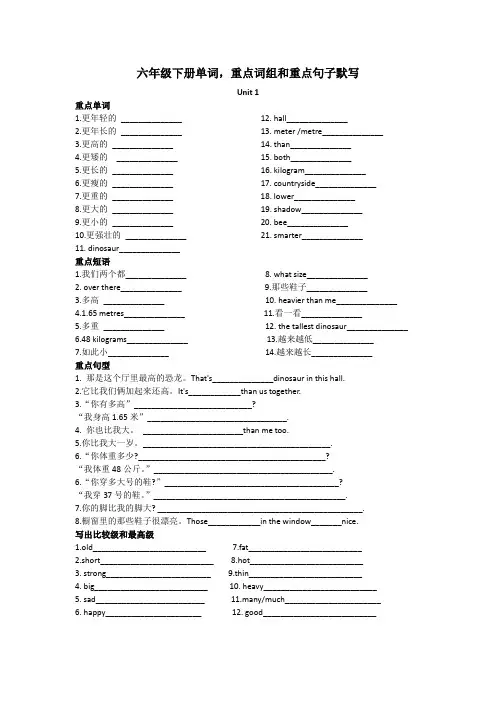
六年级下册单词,重点词组和重点句子默写Unit 1重点单词1.更年轻的______________ 12. hall______________2.更年长的______________ 13. meter /metre______________3.更高的______________ 14. than______________4.更矮的______________ 15. both______________5.更长的______________ 16. kilogram______________6.更瘦的______________ 17. countryside______________7.更重的______________ 18. lower______________8.更大的______________ 19. shadow______________9.更小的______________ 20. bee______________10.更强壮的______________ 21. smarter______________11. dinosaur______________重点短语1.我们两个都______________ 8. what size______________2. over there______________ 9.那些鞋子______________3.多高______________ 10. heavier than me______________4.1.65 metres______________ 11.看一看______________5.多重______________ 12. the tallest dinosaur______________6.48 kilograms______________ 13.越来越低______________7.如此小______________ 14.越来越长______________重点句型1. 那是这个厅里最高的恐龙。
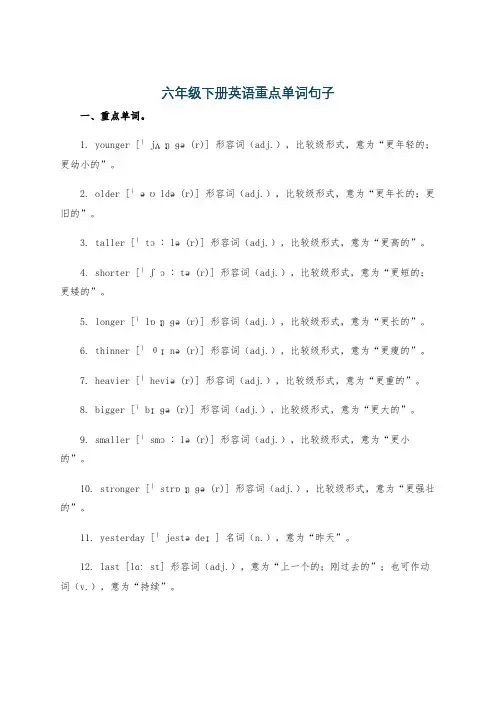
六年级下册英语重点单词句子一、重点单词。
1. younger [ˈjʌŋɡə(r)] 形容词(adj.),比较级形式,意为“更年轻的;更幼小的”。
2. older [ˈəʊldə(r)] 形容词(adj.),比较级形式,意为“更年长的;更旧的”。
3. taller [ˈtɔːlə(r)] 形容词(adj.),比较级形式,意为“更高的”。
4. shorter [ˈʃɔːtə(r)] 形容词(adj.),比较级形式,意为“更短的;更矮的”。
5. longer [ˈlɒŋɡə(r)] 形容词(adj.),比较级形式,意为“更长的”。
6. thinner [ˈθɪnə(r)] 形容词(adj.),比较级形式,意为“更瘦的”。
7. heavier [ˈheviə(r)] 形容词(adj.),比较级形式,意为“更重的”。
8. bigger [ˈbɪɡə(r)] 形容词(adj.),比较级形式,意为“更大的”。
9. smaller [ˈsmɔːlə(r)] 形容词(adj.),比较级形式,意为“更小的”。
10. stronger [ˈstrɒŋɡə(r)] 形容词(adj.),比较级形式,意为“更强壮的”。
11. yesterday [ˈjestədeɪ] 名词(n.),意为“昨天”。
12. last [lɑːst] 形容词(adj.),意为“上一个的;刚过去的”;也可作动词(v.),意为“持续”。
13. before [bɪˈfɔː(r)] 介词(prep.)/副词(adv.),意为“在……之前”。
14. hotel [həʊˈtel] 名词(n.),意为“旅馆”。
15. fixed [fɪkst] 动词(v.),fix的过去式,意为“修理;固定”。
16. broken [ˈbrəʊkən] 形容词(adj.),意为“破损的;弄坏了的”。
17. lamp [læmp] 名词(n.),意为“台灯”。
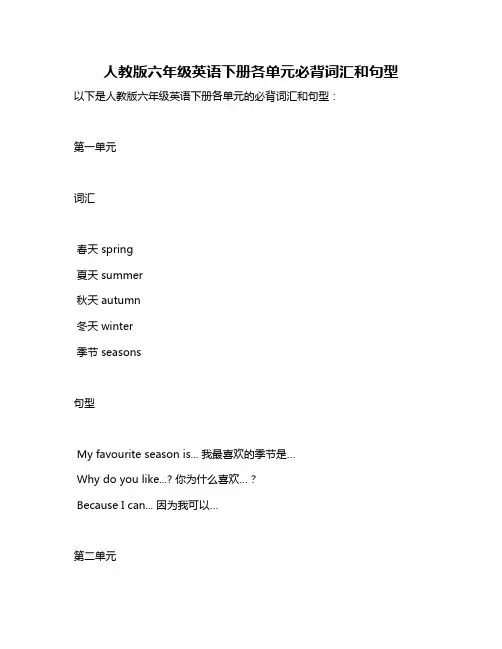
人教版六年级英语下册各单元必背词汇和句型以下是人教版六年级英语下册各单元的必背词汇和句型:第一单元词汇春天 spring夏天 summer秋天 autumn冬天 winter季节 seasons句型My favourite season is... 我最喜欢的季节是…Why do you like...? 你为什么喜欢…?Because I can... 因为我可以…第二单元词汇游泳 swim滑冰 skate放风筝 fly a kite堆雪人 make a snowman季节活动 seasonal activities句型What do you do in the...? 你在…做什么?I usually... 我通常…Do you often...? 你经常…吗?Yes, I do. / No, I don’t. 是的,我经常。
/ 不,我不经常。
第三单元词汇星期一 Monday星期二 Tuesday星期三 Wednesday星期四 Thursday星期五 Friday星期六 Saturday星期日 Sunday星期 weekdays星期天 weekends句型What do you have on...? 你星期几有什么课?I have... 我星期几有…课。
When do you have...? 你什么时候有…课? I have... on... 我在星期几有…课。
第四单元词汇电影 movies公园 parks图书馆 libraries博物馆 museums商店 shops饭店 restaurants医院 hospitals学校 schools银行 banks邮局 post offices公共场所 public places 句型。
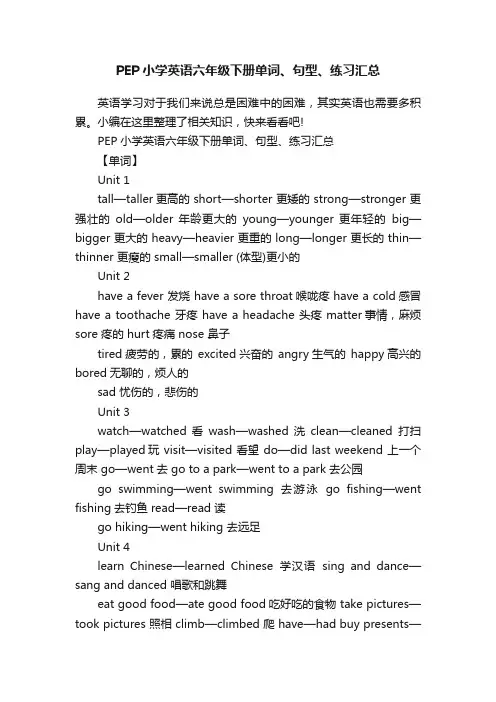
PEP小学英语六年级下册单词、句型、练习汇总英语学习对于我们来说总是困难中的困难,其实英语也需要多积累。
小编在这里整理了相关知识,快来看看吧!PEP小学英语六年级下册单词、句型、练习汇总【单词】Unit 1tall—taller更高的 short—shorter 更矮的 strong—stronger 更强壮的old—older 年龄更大的young—younger 更年轻的big—bigger 更大的 heavy—heavier 更重的 long—longer 更长的 thin—thinner 更瘦的 small—smaller (体型)更小的Unit 2have a fever 发烧 have a sore throat喉咙疼 have a cold感冒have a toothache 牙疼 have a headache 头疼 matter事情,麻烦sore 疼的 hurt疼痛 nose 鼻子tired疲劳的,累的excited兴奋的angry生气的happy高兴的bored无聊的,烦人的sad 忧伤的,悲伤的Unit 3watch—watched 看wash—washed 洗clean—cleaned打扫play—played玩 visit—visited 看望 do—did last weekend 上一个周末 go—went去 go to a park—went to a park去公园go swimming—went swimming去游泳go fishing—went fishing去钓鱼 read—read 读go hiking—went hiking 去远足Unit 4learn Chinese—learned Chinese学汉语sing and dance—sang and danced 唱歌和跳舞eat good food—ate good food吃好吃的食物 take pictures—took pictures 照相 climb—climbed 爬 have—had buy presents—bought presents买礼物row a boat—rowed a boat 划船see elephant—saw elephant 看大象 go skiing—went skiing 去滑雪 go ice-skating—went ice-skating 去滑冰 how怎么,如何 get—got 到达 last 上一个的,仅余的,留在最后的【句子】1. How tall are you? ------ I’m 164 cm tall.你有多高? 我164厘米高.You’re shorter than me. You’re 4 cm taller than me.你比我矮. 你比我高4厘米.2. How heavy are you? ------ I’m 48 kg. I’m thinner than you, and shorte你有多重? 我48千克.我比你要更瘦,更矮.3. What’s the matter? ------ My throat is sore. My nose hurts.怎么了? 我的喉咙痛.我的鼻子不舒服.4. How are you, Liu Yun? You look so happy.你怎么了,刘云? 你看起来很高兴.How are you, Sarah? You look sad today.你怎么了,萨拉?你今天看起来很伤心.5. What did you do last weekend? ------ I played football.你上周末在做什么? 我在踢足球.6. Did you read books? ------ Yes, I did. ------ No, I didn’t.你看过书了吗? 是的,我是. 不,我没有.7. Where did you go on your holiday? ------ I went to Xinjiang.你假期去了哪? 我去了新疆.8. How did you go there? ------ I went by train.你怎样去的? 我乘火车去的.六年级pep英语下册期末总复习测试题Unit 11、短语:更高的更更矮的更强壮的年龄更大的更年轻的更重的更瘦的更长的更大的更小的更滑稽的2、连词成句(1)are to How tall you ?(2)shorter are you me 4cm than .(3)bigger stranger and you than am I3、根据汉语完成下列句子(1)你比你的弟弟高 ? You are ______ ______your brother.(2)那只猴子你最喜欢? ______monkey do you like ________(3)黄色的猴子大概40cm 高。
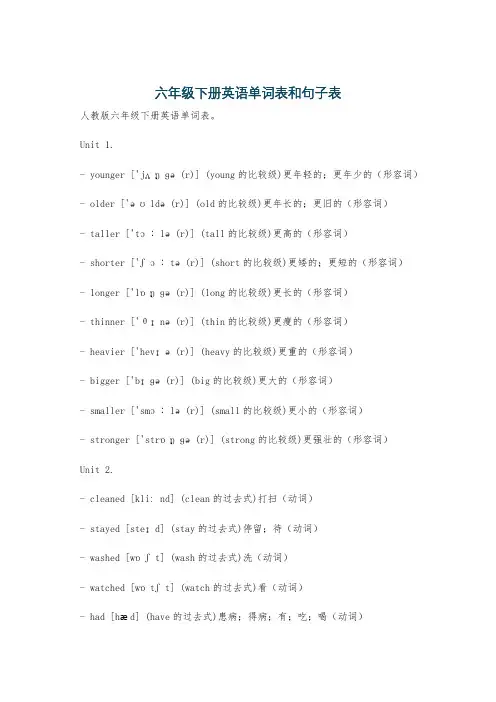
六年级下册英语单词表和句子表人教版六年级下册英语单词表。
Unit 1.- younger ['jʌŋɡə(r)] (young的比较级)更年轻的;更年少的(形容词)- older ['əʊldə(r)] (old的比较级)更年长的;更旧的(形容词)- taller ['tɔːlə(r)] (tall的比较级)更高的(形容词)- shorter ['ʃɔːtə(r)] (short的比较级)更矮的;更短的(形容词)- longer ['lɒŋɡə(r)] (long的比较级)更长的(形容词)- thinner ['θɪnə(r)] (thin的比较级)更瘦的(形容词)- heavier ['hevɪə(r)] (heavy的比较级)更重的(形容词)- bigger ['bɪɡə(r)] (big的比较级)更大的(形容词)- smaller ['smɔːlə(r)] (small的比较级)更小的(形容词)- stronger ['strɒŋɡə(r)] (strong的比较级)更强壮的(形容词)Unit 2.- cleaned [kliːnd] (clean的过去式)打扫(动词)- stayed [steɪd] (stay的过去式)停留;待(动词)- washed [wɒʃt] (wash的过去式)洗(动词)- watched [wɒtʃt] (watch的过去式)看(动词)- had [hæd] (have的过去式)患病;得病;有;吃;喝(动词)- had a cold感冒。
- slept [slept] (sleep的过去式)睡觉(动词)- read [red] (read的过去式)读;阅读(动词)- saw [sɔː] (see的过去式)看见(动词)- last [lɑːst] 最近的;上一个的(形容词);最后(副词)- yesterday ['jestədeɪ] 昨天(名词)- before [bɪ'fɔː(r)] 在……之前(介词、连词)Unit 3.- went [went] (go的过去式)去(动词)- camp [kæmp] 野营(动词、名词)- went camping去野营。
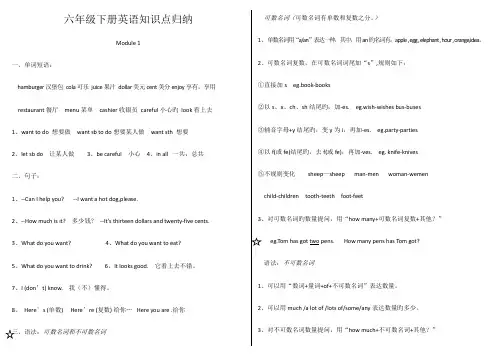
六年级下册英语知识点归纳Module 1一、单词短语:hamburger 汉堡包cola 可乐juice 果汁dollar 美元cent 美分enjoy 享有,享用restaurant 餐厅menu 菜单cashier 收银员careful 小心旳 look 看上去1、want to do 想要做want sb to do想要某人做want sth 想要2、let sb do 让某人做3、be careful 小心4、in all 一共,总共二、句子:1、--Can I help you? --I want a hot dog,please.2、--How much is it? 多少钱?--It’s thirteen dollars and twenty-five cents.3、What do you want?4、What do you want to eat?5、What do you want to drink?6、It looks good. 它看上去不错。
7、I (don’t) know. 我(不)懂得。
8、Here’s (单数) Here’re (复数) 给你…Here you are .给你可数名词和不可数名词可数名词(可数名词有单数和复数之分。
)数名词用“a/an”表达一种,其中,用an旳名词有:apple , egg , elephant , hour , orange,idea。
s”,规则如下:s eg.book-bookss、x、ch、sh结尾旳,加-es. eg.wish-wishes bus-buses+y结尾旳,变y为i,再加-es. eg.party-partiesf(或fe)结尾旳,去f(或fe),再加-ves. eg. knife-knivessheep—sheep man-men woman-wemenchild-children tooth-teeth foot-feethow many+可数名词复数+其他?”eg.Tom has got two pens. How many pens has Tom got?语法:不可数名词+量词+of+不可数名词”表达数量。
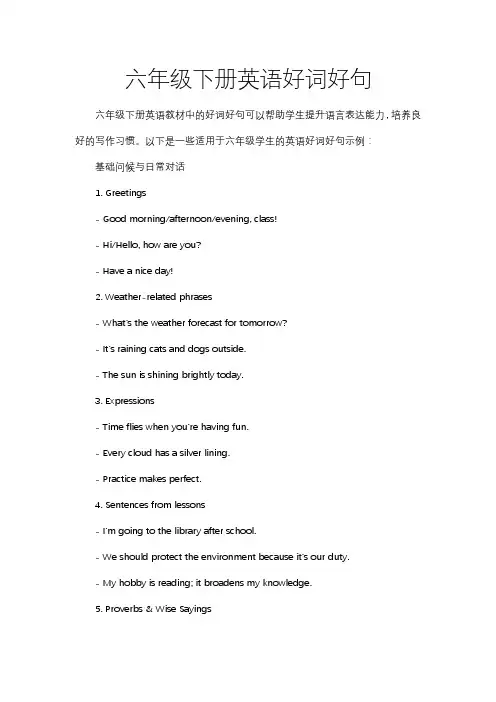
六年级下册英语好词好句六年级下册英语教材中的好词好句可以帮助学生提升语言表达能力,培养良好的写作习惯。
以下是一些适用于六年级学生的英语好词好句示例:基础问候与日常对话1. Greetings- Good morning/afternoon/evening, class!- Hi/Hello, how are you?- Have a nice day!2. Weather-related phrases- What's the weather forecast for tomorrow?- It's raining cats and dogs outside.- The sun is shining brightly today.3. Expressions- Time flies when you're having fun.- Every cloud has a silver lining.- Practice makes perfect.4. Sentences from lessons- I'm going to the library after school.- We should protect the environment because it's our duty.- My hobby is reading; it broadens my knowledge.5. Proverbs & Wise Sayings- Where there's a will, there's a way.- Actions speak louder than words.- A friend in need is a friend indeed.6. Descriptive Phrases- The colorful rainbow painted the sky after the rain.- She had a heart full of kindness and a smile brighter than the sun. - He reads books voraciously, expanding his horizons with each page.结构性句型- Comparisons- Mike runs fast, but I run faster.- This book is more interesting than the last one I read.- Conditional Sentences- If I were a bird, I would fly high in the sky.- I'll help you if you promise to study harder.- Questions- Could you please pass me the salt?- How do you usually spend your weekends?- Giving Opinions- In my opinion, teamwork is essential for success.- I think it's important to eat a healthy breakfast.。
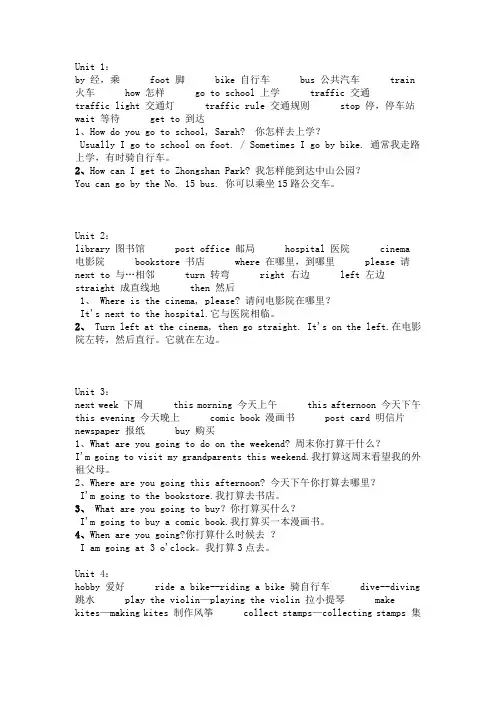
Unit 1:by 经,乘 foot 脚 bike 自行车 bus 公共汽车 train 火车 how 怎样 go to school 上学 traffic 交通traffic light 交通灯 traffic rule 交通规则 stop 停,停车站wait 等待 get to 到达1、How do you go to school, Sarah? 你怎样去上学?Usually I go to school on foot. / Sometimes I go by bike. 通常我走路上学,有时骑自行车。
2、How can I get to Zhongshan Park? 我怎样能到达中山公园?You can go by the No. 15 bus. 你可以乘坐15路公交车。
Unit 2:library 图书馆 post office 邮局 hospital 医院 cinema 电影院 bookstore 书店 where 在哪里,到哪里 please 请next to 与…相邻 turn 转弯 right 右边 left 左边straight 成直线地 then 然后1、 Where is the cinema, please? 请问电影院在哪里?It's next to the hospital.它与医院相临。
2、 Turn left at the cinema, then go straight. It's on the left.在电影院左转,然后直行。
它就在左边。
Unit 3:next week 下周 this morning 今天上午 this afternoon 今天下午this evening 今天晚上 comic book 漫画书 post card 明信片newspaper 报纸 buy 购买1、What are you going to do on the weekend? 周末你打算干什么?I'm going to visit my grandparents this weekend.我打算这周末看望我的外祖父母。
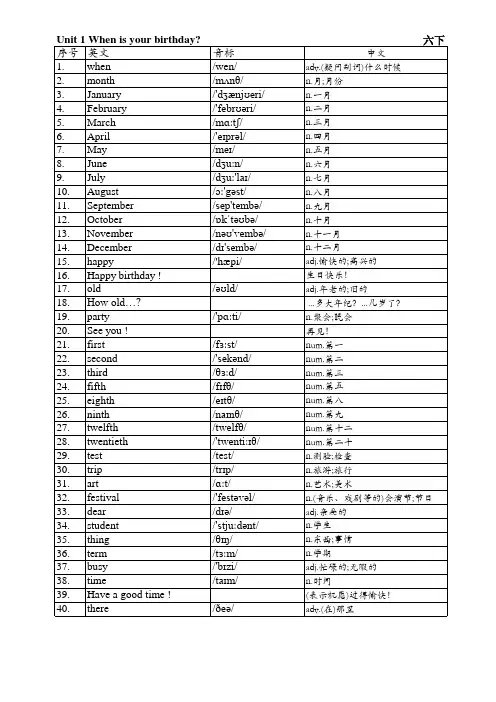
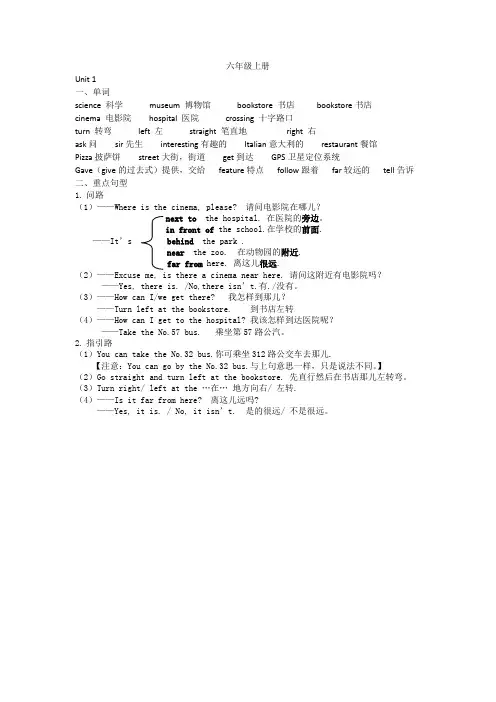
六年级上册Unit 1一、单词science 科学museum 博物馆bookstore 书店bookstore书店cinema 电影院hospital 医院crossing 十字路口turn 转弯left 左straight 笔直地right 右ask问sir先生interesting有趣的Italian意大利的restaurant餐馆Pizza披萨饼street大街,街道get到达GPS卫星定位系统Gave(give的过去式)提供,交给feature特点follow跟着far较远的tell告诉二、重点句型1.问路(1)——Where is the cinema, please? 请问电影院在哪儿?next to the hospital. 在医院的旁边。
in front of the school.在学校的前面.——It’s behind the park .near the zoo. 在动物园的附近.far from here. 离这儿很远.(2)——Excuse me, is there a cinema near here. 请问这附近有电影院吗?——Yes, there is. /No,there isn’t.有./没有。
(3)——How can I/we get there? 我怎样到那儿?——Turn left at the bookstore. 到书店左转(4)——How can I get to the hospital? 我该怎样到达医院呢?——Take the No.57 bus. 乘坐第57路公汽。
2.指引路(1)You can take the No.32 bus.你可乘坐312路公交车去那儿.【注意:You can go by the No.32 bus.与上句意思一样,只是说法不同。
】(2)Go straight and turn left at the bookstore. 先直行然后在书店那儿左转弯。
六年级下册英语单词表句子表人教版六年级下册英语单词表。
Unit 1.- young [jʌŋ] adj. 年轻的;年少的。
- old [əʊld] adj. 年老的;岁数大的。
- funny ['fʌnɪ] adj. 滑稽的;可笑的。
- kind [kaɪnd] adj. 体贴的;慈祥的;宽容的。
- strict [strɪkt] adj. 要求严格的;严厉的。
- polite [pə'laɪt] adj. 有礼貌的;客气的。
- hard - working [hɑː d 'wɜːkɪŋ] adj. 工作努力的;辛勤的。
- helpful ['helpfl] adj. 有用的;愿意帮忙的。
- clever ['klevə(r)] adj. 聪明的;聪颖的。
- shy [ʃaɪ] adj. 羞怯的;腼腆的;怕生的。
重点句子。
1. -Who's your art teacher? [huːz jɔː(r) ɑːt ˈtiːtʃə(r)] 谁是你的美术老师?-Mr Jones. [ˈmɪstə(r) dʒəʊnz] 琼斯先生。
2. -Is he young? [ɪz hiː jʌŋ] 他年轻吗?-Yes, he is. [jes hiːɪz] 是的,他年轻。
3. -What's he like? [wɒts hiː laɪk] 他什么样?-He's kind. [hiːz kaɪnd] 他很和蔼。
Unit 2.- Monday ['mʌndeɪ] n. 星期一。
- Tuesday ['tjuːzdeɪ] n. 星期二。
- Wednesday ['wenzdeɪ] n. 星期三。
- Thursday ['θɜːzdeɪ] n. 星期四。
- Friday ['fraɪdeɪ] n. 星期五。
- Saturday ['sætədeɪ] n. 星期六。
Unit 1(单元1)之杨若古兰创作一.单词:sport(活动) football (足球) any (任一;一些) some (一些)wear (穿)or(或者;还是)baskball (篮球)heavy (重的)difficult (困难的;费力) easy(容易的) hand (手) ask (问) answer(回答;答案) game (角逐;游戏) very|(很;非常)policeman (警察) are (是<用于you,they及复数名词后> )best(最好的<good的第一流>)could (能<can的过去式> light (轻的;灯)something (某物;某事)teach (教) thought(想<think的过去式>) you (你;你们)二、短语:playbasketball /football/pingpong打篮球/踢足球 /打乒乓球 sports shop (体育用品) play a game(进行一场角逐) play with (---和---一路玩) have fun(玩的高兴)三.句子:1、ping-pong is my favourite sport.乒乓球是我最爱好的活动.2、Can you teach me to play ping-pong?你能教我打乒乓球吗?3、Do you have any ping-pong balls?你有乒乓球吗?4、Do you like this T-shirt or that T-shirt ?你爱好这件T恤衫还是那件T恤衫?5、Here I go!我来了!6、I'm throwing the basketball.我正在仍篮球.7、Li Ming bought a T-shirt today.今天李明买了一件T恤衫.Unit 2(单元2)一.单词Strong(强壮的;无力的)healthy (健康的)after(在---以后)before (在---之前)next(紧接着;下一个的)bad (无害的;蹩脚的)often (经常;经常) exercise (锻炼;练习) minute (分) hour (小时) high (高的;在高处) be (是<am, is, are的本相>) first (首先) get (得到)thank (感谢)二、短语:be good for(对---有好处)have breakfast(吃早餐)wash one”s hands (洗手)go to school(去上学)be bad for(对---无害处)do one”s homework(做某人的家庭功课)get up(起床)last week(上周)twice a week(一周两次)at about 7:30 on Tuesday morning (在礼拜二早上大约七点半)keep away(阔别) work home(步行回家)from---to---(从---到---) work hard(努力工作;进修) on time(按时;准时)have to(不克不及不;必须) make lunch(做午餐)三.句子:1、How often did Danny and Kim have breakfast last week?上周丹尼和金多久吃一次早餐?2、After breakfast, he goes to school.早餐后、他去上学.3、Jenny doesn”t go to school on those days.在那些日子詹妮不上学.4、What do you do before breakfast?早餐前你做什么?5、Why?Because I want strong, healthy teeth.为何?由于我想要有坚固、健康的牙齿.6、What”s your favourite food?你最爱好的食物是什么?7、Riding a bike is exercise.骑自行车是锻炼.8、Exercise helps make your body healthy and strong.锻炼帮忙使你的身体健康和强壮.9、How many minutes does Danny exercise? 丹尼锻炼多少分钟?10、I clean my bedroom on Saturdays.我每周六打扫我的卧室.Unit 3(单元3)一.单词:fan(风扇;扇子) angry (发怒的;生气的) close (关;闭) swim (泅水<过去式 swam >) lake(湖) ship (船;舰) visit(访问;观赏) clever(聪明的)cloud (云)snowy (多雪的)Canada (加拿大)June(六月)second (第二) third (第三) wind(风)二、短语:In winter(在冬季)like to do sth(爱好做某事)look at---(看----)summer holiday(暑假)go on trips=go on a trip(去旅行)last summer(去年炎天)look up at---(向上看/抬头看---)see sb. doing sth.(看见某人正在做某事)on June25(在六月二十五号)fly home(飞回家)say hello to--(向---问好)feel happy to do sth(做某事感到高兴)in the sky(在天空)think about(思考;考虑)be afraid of---(害怕---)go skating(去滑冰)make snowmen= make a snowman(堆雪人)something different(分歧的东西)三.句子:1.What happens to trees in different seasons?树木在分歧的季节里发生了什么(变更)?2.Many trees don”t have any leaves.很多树木没有了叶子.3.We will go to the park.我们将要去公园.4.You can”t pick t he flowers in the park!你不克不及在公园里摘花!5.My family like to go on trips in the summer.我的家人爱好在炎天去旅行.6.Oh, summer`s coming, coming soon.哦,炎天要来了,很快就要来了.7.How beautiful I am!我是多么的漂亮啊!Unit 4(单元4)一.单词:find(发现;找到<过去式found>)party(晚会;聚会)tell(告诉;讲述)begin(开始)late(晚的;迟到的)early(早的;早到的)every(每个<人或物>)all (全部;所有的) cake (蛋糕) hear (听见;听到)ice cream (冰淇淋) sadly (伤心肠;哀思地) slowly(缓慢地;迟缓地)二、短语:Bus sth . for sb.=bus sb.sth.(为某人买某物)a photo of you(你的一张照片)give sth. To sb.=give sb. Sth.(把某物给某人)all of---(所有的---)talk to sb.(和某人交谈)get home(到家)get ready to do sth.= get ready for sth.(为---做好筹办)tell sb.about sth.(告诉某人有关某事)look like(看起来像)know about(晓得;了解)begin with(以---开始)at the airport(在飞机场)a little(一点儿)leave for+地点名词动身去某地;前往某地)forget to go sth.(健忘做某事)a piece of(一块/张/片---)by the river(在河边)fall into(---掉进---)三.句子:1.Here are some little flags.这儿有些小旗.2.2.What about these caps?这些帽子怎样样?3.I`ll take three T-shirts.我要买三件T恤衫.4.4.How much are the gifts?这些礼物多少钱?5. May I see them?我何以看看它们吗?6. It`s Jenny calling.我是詹妮.7. Would you come to a party for Li Ming?你情愿来介入为李明举办的聚会吗?8. Here she comes.她来了.9. It`s time for me to go.是我该走的时候了.10. Have a good trip!旅行高兴!。
外研版英语(三起点)六年级下册知识归纳第一模块一、单元词汇look看上去cashier收银员cola可乐dollar美元cent美分enjoy享用,享受careful小心的Be careful!当心!二、重点句型(点餐)1. A: Can I help you?B: I want a hot dog, please.2. A: And to drink?B: I want a cola. /Three colas, please.3. A: How much is it?B: It’s thirteen dollars and twenty-five cents.A: Here you are.B: Thank you. Enjoy your meal!4. A: What do you want to eat / drink?B: I want noodles and a cola. /Milk, please.一、单元词汇later后来,以后to go剩余duck鸭子pond水池,池塘cloud云dry干的like像......一样look like看来好像stay保持,维持二、重点句型1. A: When are we going to eat?B: At half past twelve.2. Look at the ducks! They’re eating our sandwiches!3. 明天的天气将会......It will be + 天气(形容词)+ in + 城市(名词).It will + 天气(名词)+ in + 城市(名词).It will be sunny in Harbin.It will rain in Beijing.一、单元词汇shine(太阳)发光,照耀cry哭everyone人人,每人;大家fly away飞走just就,且请cow奶牛blow吹,刮rabbit兔子二、重点句型正在做某事:主语+ am/is/are + v.-ing + 其他.1. The sun is shining.2. The birds are singing in the tree.3. A: What are you doing?B: I’m cleaning my room.三、语法知识现在分词的变化规则1、一般动词直接在词尾加-ing: read→reading(读) talk→talking(交谈)2、以不发音的e结尾的动词,先去e再加-ing: write→writing(写)3、以重读闭音节结尾且末尾只有一个辅音字母的动词,双写这个辅音字母再加-ing:swim→swimming(坐)run→running(跑)4、少数几个以ie结尾的动词,变ie为y,再加-ing: lie→lying (躺,口诀记忆:动词-ing很好记,一般情况直接加。
六年级的英语重点单词句子1. Family(家庭)- 这个单词用来描述一个人的家庭成员。
例如:My family includes my parents, my sister and me.(我的家庭成员包括我的父母,我的妹妹和我。
)2. Weather(天气)- 这个单词用于描述天气条件。
例如:The weather today is sunny and warm.(今天的天气晴朗温暖。
)3. Delicious(美味的)- 这个单词用来形容食物的味道。
例如:The cake is delicious.(蛋糕很美味。
)4. Exercise(锻炼)- 这个单词用于描述身体活动。
例如:I like to exercise in the morning.(我喜欢在早上锻炼。
)5. Homework(作业)- 这个单词用于描述学生需要完成的任务。
例如:I have a lot of homework to do tonight.(今晚我有很多作业要做。
)6. Stationery(文具)- 这个单词用来描述需要在学校或办公室中使用的物品。
例如:I need to buy some stationery for school.(我需要买一些学校用的文具。
)7. Friendship(友谊)- 这个单词用于形容朋友之间的关系。
例如:We have a strong friendship.(我们之间有着坚固的友谊。
)8. Weekend(周末)- 这个单词用来描述工作或学习之后的时间。
例如:I like to relax on the weekend.(我喜欢在周末放松。
)9. Vacation(假期)- 这个单词用于描述休息和放松的时间。
例如:We are going on vacation to the beach.(我们打算去海滩度假。
)10. Music(音乐)- 这个单词用来描述声音和节奏的艺术形式。
六年级下册重点必背英语单词六年级下册英语单词是学习英语必不可少的部分。
在这个阶段,学生需要巩固并扩大自己的英语词汇量,为高中或更高级别的英语学习做好准备。
下面将详细介绍六年级下册重点必背英语单词。
1. astronaut(n.宇航员)- a person who travels in space例句:Neil Armstrong was the first astronaut to walk on the moon.2. galaxy(n.星系)- a system of billions of stars, along with gas and dust, held together by gravitational attraction例句:The Milky Way is our galaxy.3. launch(v.发射)- to send an object into space or the air例句:They will launch a new satellite next week.4. explore(v.探索)- to travel around a place in order to learn about it例句:We explored the ancient ruins and discovered many interesting artifacts.5. orbit(n.轨道)- the path that an object follows as it goes around another object in space例句:The Earth orbits around the sun.6. solar(adj.太阳的)- relating to the sun例句:Solar energy can be used to power homes and buildings.7. satellite(n.卫星)- an object that is sent into space to revolve around the Earth, collect information, or communicate例句:The satellite provides images of the Earth's surface.8. astronautics(n.宇宙航空学)- the science and technology of space flight例句:He has a degree in astronautics.9. telescope(n.望远镜)- an optical instrument used to view distant objects 例句:He looked through the telescope and saw the stars.10. crater(n.火山口)- a large, bowl-shaped hole on the surface of a planet or moon, typically caused by an impact of a meteorite例句:The moon has many craters on its surface.11. universe(n.宇宙)- all existing matter and space considered as a whole;the cosmos例句:Scientists are still trying to understand the origins of the universe.12. meteor(n.流星)- a small body of matter from outer space that enters the Earth's atmosphere, becoming incandescent as a result of friction and appearing as a streak of light例句:We saw a shooting star, which is actually a meteor burning up in the Earth's atmosphere.13. gravity(n.重力)- the force that attracts objects toward each other, especially the force that attracts objects towards the center of the Earth例句:Gravity keeps us grounded to the Earth.14. alien(n.外星人)- a creature from outer space例句:In science fiction movies, aliens often visit Earth.15. exploration(n.探索)- the action of traveling in or through an unfamiliar area in order to learn about it例句:The team embarked on an exploration of the Amazon rainforest.16. mission(n.任务)- an important assignment carried out for a specific purpose例句:Their mission was to find a cure for the disease.17. module(n.舱段)- a self-contained unit or system within a larger system, often designed to be used in conjunction with other units例句:The lunar module landed safely on the moon.18. oxygen(n.氧气)- a colorless, odorless reactive gas that is necessary for respiration and exists as a diatomic molecule例句:We need oxygen to survive.19. atmosphere(n.大气层)- the envelope of gases surrounding the Earth or another planet例句:The atmosphere protects us from harmful radiation from the sun.20. discovery(n.发现)- the action or process of finding something new or previously unknown例句:The discovery of penicillin revolutionized medicine.21. equipment(n.设备)- the tools, machinery, and furniture needed for a particular activity or work例句:The scientists in the lab used various equipment to conduct their experiments.22. laboratory(n.实验室)- a room or building equipped for scientific research例句:She spent most of her time in the laboratory working on her thesis.23. experiment(n.实验)- a scientific procedure conducted to make a discovery or demonstrate a known fact例句:The teacher conducted an experiment to show how plants grow under different conditions.24. variable(n.变量)- a factor that can change in a mathematical orscientific study例句:Temperature is a variable that can affect the growth of plants.25. hypothesis(n.假设)- a proposed explanation for a phenomenon, often one that is based on limited evidence and subject to further investigation例句:The scientist formed a hypothesis and designed an experiment to test it.26. conclusion(n.结论)- the end or finish of an event, process, or text例句:After analyzing the data, the researchers drew the conclusion that the experiment was successful.27. evidence(n.证据)- facts or proof used to support a theory or argument例句:The fingerprints on the window were the evidence that led the police to the culprit.28. research(n.研究)- the activity of investigating a subject in detail例句:She is conducting research on the effects of climate change on local ecosystems.29. conclusion(n.结论)- the end result of a process of reasoning or a investigation例句:Based on the evidence, the court reached the conclusion that the defendant was guilty.30. theory(n.理论)- a set of principles or ideas intended to explain something, especially one that has been widely accepted例句:The theory of evolution explains how species change over time.31. innovation(n.创新)- the act or process of inventing or creating something new例句:The smartphone was a innovation that changed the way we communicate. 32. problem(n.问题)- a matter or situation that is causing difficulty, typically one that needs to be addressed or solved例句:The lack of access to clean water is a problem that affects many communities.33. solution(n.解决方案)- a way of solving a problem or dealing with a difficult situation例句:The engineers developed a solution to fix the malfunctioning equipment.34. challenge(n.挑战)- a task or situation that tests someone's skills, abilities, or endurance例句:Adapting to a new environment can be a challenge for some people.35. opportunity(n.机会)- a favorable or appropriate time or occasion例句:She seized the opportunity to further her education.36. challenge(n.挑战)- to demand effort or skill to accomplish something例句:The climb up the mountain was a real challenge.37. success(n.成功)- the achievement of something desired, planned, or attempted例句:Her hard work and determination led to her ultimate success.38. failure(n.失败)- the lack of success or the inability to achieve something例句:Every failure is a step towards success.39. effort(n.努力)- the exertion of energy to achieve a goal or complete a task例句:It takes a lot of effort to learn a new language.40.persistence(n.坚持)- the continued effort to achieve something despite difficulty or failure这些是六年级下册重点必背英语单词,通过学习和掌握这些词汇,学生可以更好地理解和使用英语,为进一步的学习打下坚实的基础。
去沙滩享受日光浴看月亮和星星
待在家里聚会过春节乘飞机太阳月亮星星在晚上在家里听英语讲英语读英语写英语用英语交谈用英语玩游戏学;学习;学到很多
单词;词黑板说做任务举办英语聚会表演戏剧
互相学习学科课但是昨天为什么用
1、我们应经学了很多英语单词。
2、我们互相学习。
3、你假期做什么?
4、我去了三亚。
5、我们对英语非常感兴趣。
6、你怎么学英语?
7、我们通过做事情学英语。
银行在……前面书店在……后面宾馆服装店超市在马路对面医院河流在……附近在……旁边在……中间健康的(食品)蔬菜顺着这条街走交通灯处右转穿过马路大街;街道右转/左转在右边/左边
分钟;一会儿城市图书馆饭店邮局骑自行车乘地铁步行半小时城市图书馆
1、我家的前面是一家银行。
2、我怎样能到市图书馆?
3、你坐第六路公交车.
4、我家的附近有一家银行。
5、书店在哪儿?
6、顺着这条街走。
7、书店在左边。
美国上海西安大连乘飞机乘火车乘轮船旅行知道听见湖;湖泊明十三陵天坛紫禁城北海公园明天参观长城
他们;她们;它们(they的宾格)英国伦敦塔桥大本钟尼亚加拉瀑布加拿大加拿大国家电视塔澳大利亚悉尼歌剧院迪士尼乐园想看见最喜欢的位置;地点。